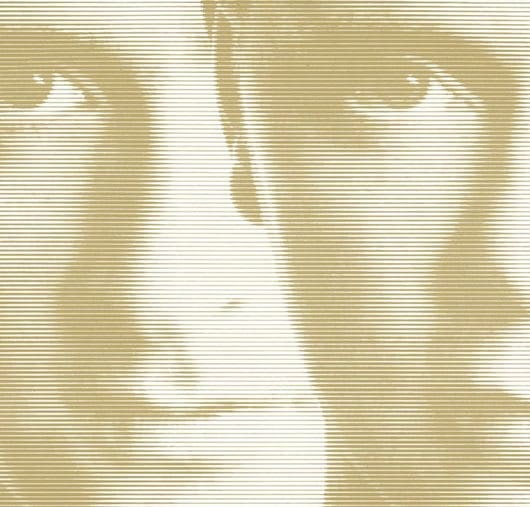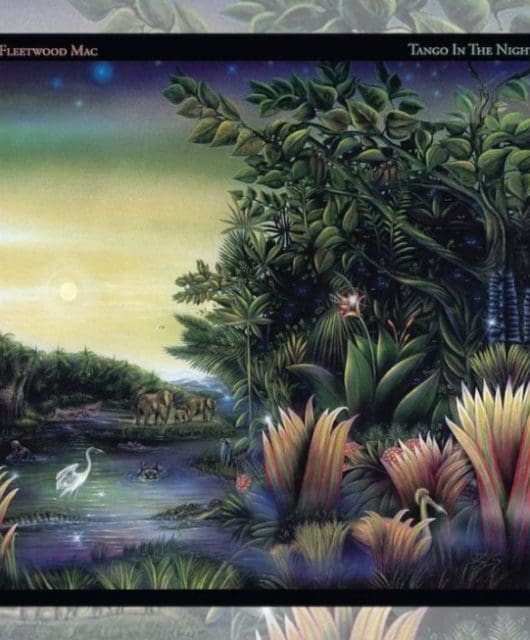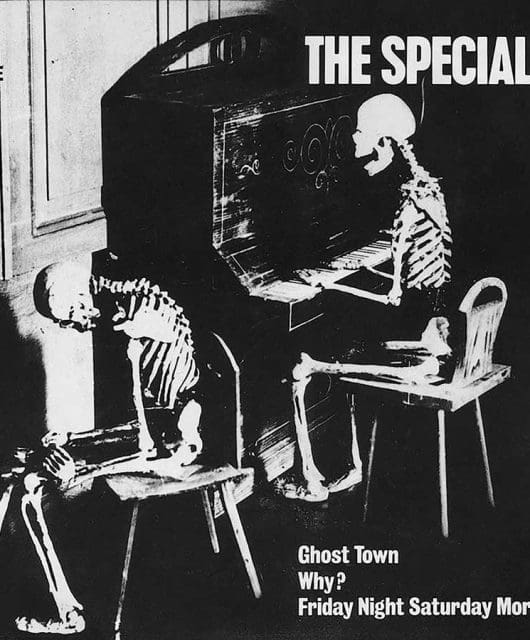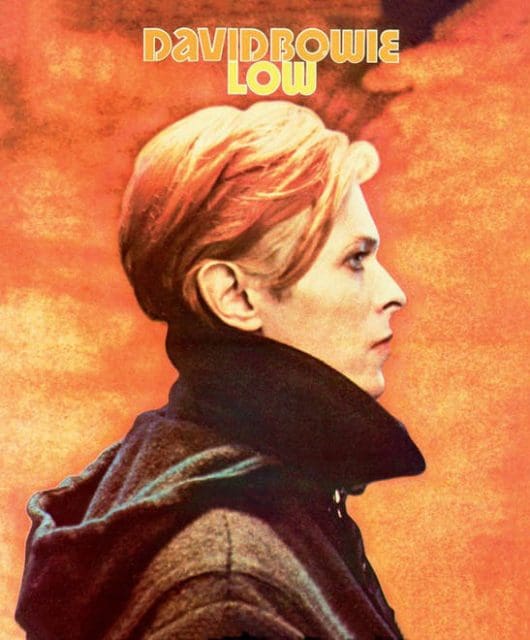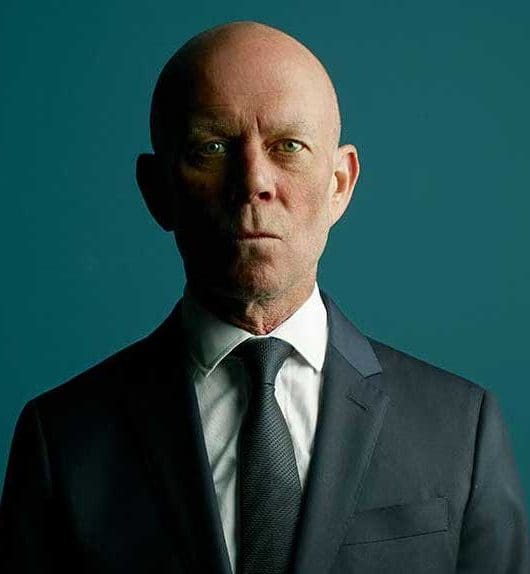Classic Album – Bronski Beat’s The Age Of Consent
By Mark Lindores | November 21, 2024
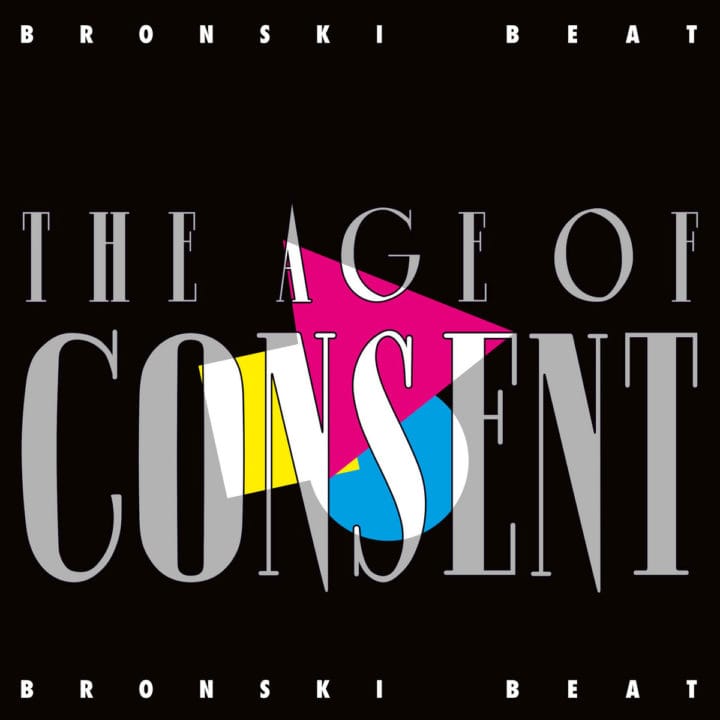
Bronski Beat’s The Age Of Consent packed political punch and pop hooks galore, sending the accidental superstars stratospheric with their blend of art and activism…
Bronski Beat’s Top Of The Pops debut on 7 June 1984 may have lacked the visual impact of David Bowie draping his arm around Mick Ronson or the Rasta-inspired androgyny of Boy George, but in terms of making a statement about sexual politics, their performance of debut single Smalltown Boy said it all. A pulsating slice of synth-pop, it was not only one of the most authentic testimonials to growing up gay ever committed to vinyl, but also a showcase for one of the most distinctive voices of the decade.
Incredibly, frontman Jimmy Somerville had never even entertained the idea of a career in music until a year previously – fully intent on using said voice to deliver political platitudes rather than pop music. “I didn’t set out to be a pop star,” he wrote in the liner notes to a reissue of The Age Of Consent in 2018. “I set out to be a troublemaker. My purpose was truth. My emotions, my desires, my hopes, my sexuality, my life. I was given the ultimate platform for dissent.”
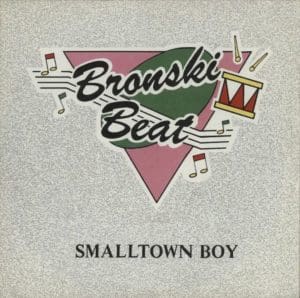
Platform For Dissent
Smalltown Boy was Jimmy’s autobiographical take on trading his troubled adolescence in Glasgow, where homophobia and the threat of violence was a daily occurrence, for the longed-for acceptance and anonymity of London in 1979. Buying himself a one-way ticket to the capital the day before his 18th birthday, he was plunged into adulthood, forced to endure an existence of sex work, squats and house-sharing (including for a time with future Pet Shop Boy Chris Lowe). An offer of a no-strings-attached attic in the house of a Hampstead doctor gave him the required fixed abode to secure a steady job in Heal’s department store – the first steps to making London his home.
After holding down the job for four years, Jimmy began his transition into his next unlikely career move – pop star. Having always possessed a strong passion for music – particularly soul, disco and blues – he indulged it by becoming an ardent acolyte of the kink and drink of London’s nocturnal playground, frequenting bars and nightclubs such as Heaven, Spats, Comptons, The Pink Panther and, most significantly, The Bell. Famous for its alternative take on gay nightlife, eschewing pop and pounding hi-NRG in favour of punk, goth and synth-pop, the pub’s clientele was as passionate about politics as it was its music, and The Bell served as the HQ for many a benefit or rally centred around social injustice and sexual politics. Impassioned by activism, close alliances were formed.
Impassioned By Activism
It was here that Jimmy became part of a large group of like-minded creatives that shared similar views and interests which included Richard Coles (later his partner in The Communards) and Larry Steinbachek. The latter was working as an engineer for British Telecom at the time and had a fascination with synthesizers and electronics and had a mini home studio in which he liked to experiment. Home was a shared house in Brixton with his partner Steve Bronski (also a Glaswegian) and, when a room in the house came up for rent, Larry invited Jimmy to move in.
The flatmates almost immediately progressed to accidental bandmates thanks to the GLC (Greater London Council), which was making Framed Youth: The Revenge Of The Teenage Perverts, a documentary about young, gay people by young, gay people. Jimmy had played an active role in the documentary and, as the low budget production had no funds to licence music, sought contributions from the documentary’s participants to serve as its soundtrack. Jimmy recited a self-penned poem called Screaming over a sparse drum machine, not realising he had inadvertently written his first song.
As Larry and Steve had been experimenting with their own musical ideas at home, Jimmy respected their opinions and sought their feedback on the track. Steve later recalled being “astounded” by what he played for them – not only his visceral lyricism, but also his delivery, struggling to equate the higher register of his vocals with the gruff Scottish brogue of his speaking voice.
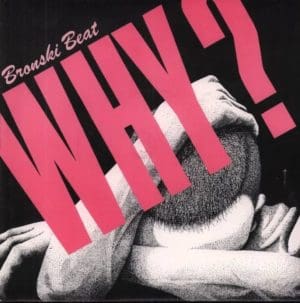
Visceral Lyricism
Screaming ignited a creative spark which led to them collaborating on more music together as a trio and marked the birth of the band. Just five months later, Bronski Beat (named as a riff on Roxy Music) made their live debut at September In The Pink, a gay and lesbian arts festival – a performance which generated intense record company interest.
Still bewildered at the intensity and momentum of the attention they were attracting, Jimmy, Steve and Larry hastily booked some gigs and wrote more material. Their first official show, at their old stomping ground The Bell in King’s Cross, went down a storm. Comprised of six tracks, Screaming, Cadillac Car, Red Dance, Run From Love, Junk and Walking, their set received a rapturous response from the crowd (which also included prominent industry figures).
As the buzz surrounding the group intensified, a handful of gigs were hastily arranged and the boys readied new material to flesh out their sets. “It was bizarre and quite overwhelming,” Jimmy later told The Independent. “It was all so quick and was something that I had never dreamed would happen to me, because I honestly didn’t have any desire to be in showbiz.”
Musical Movement
Colin Bell (marketing manager for London Records) had been an early supporter of the band since seeing them at September In The Pink and understood their ethos perfectly, something The Bronskis held in high regard as they met with representatives from Virgin, RCA, Motown and ZTT. The latter formed a particularly aggressive campaign to sign the group. As well as trying to tempt them with samples of as-yet-unreleased tracks from the Art Of Noise to demonstrate the production skills on offer from Trevor Horn, the label outlined plans to monopolise the group’s stance on being openly gay and to highlight issues and injustices, though ZTT’s vision for the band was very different to Jimmy’s.
“If we’d signed to ZTT, Trevor Horn would have had 100 percent control over the production, and that would have also meant that ZTT would have had total control of the image and everything else,” he later told The Guardian. “That wasn’t what we were all about; we didn’t want to be controlled by anybody. We knew what we wanted to do and I’m kind of glad that we didn’t follow the trail of the money because they had some explicit ideas how to present us that I didn’t like to start with. It was just before the ‘Frankie Say Relax’ T-shirts and someone involved with them told us to get T-shirts printed with ‘Cum’ and ‘Queer’ and ‘Bent’ on them. Well, I don’t think so! Also, don’t forget the way Smalltown Boy sounded – it’s raw and very emotional. That would have all been completely flattened out by Trevor Horn.”
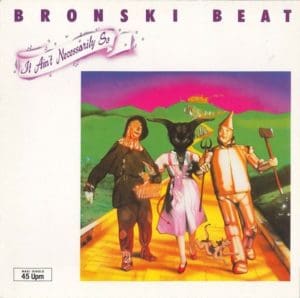
Haunting Melodrama
After much deliberation, Bronski Beat signed to London Records in 1984, after playing just nine gigs. The label understood them and offered them full support – both artistically and politically. Producer Mike Thorne recalled calling the label during recording sessions to confirm some of the more arresting lyrics would be allowed to remain in the songs uncensored and the answer was unanimously yes. Seeing their art as an extension of their activism, this was the group’s primary concern. Understated rather than overblown, sensitive rather than sensationalist, the boys were confident in their choice when they saw the ZTT stratagem played out with Frankie Goes To Hollywood.
While Relax was punchy and controversial, Bronski Beat launched with the haunting melodrama of Smalltown Boy in May 1984. Jimmy’s story resonated not only with other gay men, who recognised their own experience on record for the first time, but had wider appeal, speaking to anyone that had ever felt like a misfit. The song crashed into the Top 10, peaking at No.3 thanks to its documentary-style video and memorable Top Of The Pops performances which showcased Jimmy’s unique voice. Constantly asked about where it came from, he joked that the only training he’d ever had was singing along to his idols Donna Summer and Sylvester.
With such a big hit on their hands, the pressure was mounting to deliver an album. Going into the studio with Mike Thorne, the group polished and re-recorded some of their earlier tracks, such as Junk and Screaming, as well as penning new songs such as Heatwave and No More War. Covers of Donna Summer’s I Feel Love and Need-A-Man Blues and Gershwin’s It Ain’t Necessarily So completed the tracklist.
Strong Social Message
As Smalltown Boy had established the three-piece as having a strong political slant, a follow-up with a strong social message was suggested. They headed to New York City to complete the album, taking time out to visit notorious BDSM bars such as The Mineshaft and The Anvil. A conflict outside the latter loosely influenced Why?, a hard-hitting tale of a homophobic attack which completed the album.
Released in October 1984 to rave reviews, The Age Of Consent went platinum in the UK, reaching No.4 and yielding four Top 20 singles. The album was heralded for its bravery. As well as tackling issues in its content, the record came packaged in a sleeve which documented the age of consent for gay men around the world along with the telephone number for the Gay & Lesbian Switchboard, prompting an influx of calls.
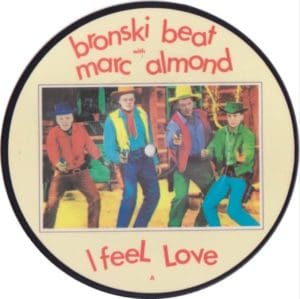
A Legacy That Lives On
Because his fame and success had been almost accidental rather than pursued, Jimmy was fearless about losing it in the face of standing up for what he believed in. “I had such an idealistic belief that I could change the world, that I could make a difference, that I could be a voice for a voiceless community,’ he reflected to The Age in 2014. “I was motivated by a passion and a fire.’’
Unfortunately, his view was at odds with those of Larry and Steve, both of whom favoured toning down the politics in a bid to chase commercial success, a compromise Jimmy was unprepared to make. He left the group to form The Communards in 1985. Steve and Larry went on to recruit a succession of singers with moderate success. As an entity, Bronski Beat may have been short-lived, but their legacy lives on thanks to the succession of openly gay artists that felt emboldened enough by them to follow in their Doc Marten-booted footsteps.
THE SONGS
1 WHY?
After the success of Smalltown Boy affirmed the band was on the right path with its mix of pop and politics, they followed it up with Why?, a hard-hitting depiction of anti-gay prejudice and violence. It was inspired by a friend of the group, Martin, who embarked on a relationship with a man under the age of consent in the UK (21 at the time) and was vilified by his partner’s irate family, branded a paedophile, and threatened with violence.
2 IT AIN’T NECESSARILY SO
A cover version of the George & Ira Gershwin and DuBose & Dorothy Heyward standard from 1935 opera Porgy And Bess, It Ain’t Necessarily So had always been controversial in the sense that it questioned the content of the Bible and how its teachings related to the evolution of man. It was the perfect riposte to those that used the Bible to challenge gay lifestyles (“Adam & Eve, not Adam & Steve” etc). Released as the band’s third single, it reached No.16 in the UK.
3 SCREAMING
The song that started it all. Beginning as a poem by Jimmy Somerville recited over a simple drum pattern for 1983’s Framed Youth: The Revenge Of The Teenage Perverts documentary, it was adopted and adapted by Larry and Steve, who added the synth line and cleaned up the production to become the first Bronski Beat song. The biographical purging of its lyric established Somerville’s ethos from the outset. “My man love, my first love/ My closetness and pain/ My lying, my deceiving,” he sings.
4 NO MORE WAR
A plaintive cry for peace is relayed over understated electronica for the self-explanatory No More War, which brings down the tempo. Somerville’s haunting vocal ranges from pleading to primal, showcasing his incredible range, while a shuffling soundscape soothes beneath. Lambasting a world in which governments prioritise funding war efforts over poverty and homelessness, it is more relevant today than ever.
5 LOVE AND MONEY
Despite its sultry sonics, replete with a saxophone solo evoking sensuality, Love And Money sees the titular assets directly correlated to pain and exploitation. Somerville’s personal experiences with using sex as a transaction for currency in order to survive when he first moved to London give the song a dark undertone, attested by the repeated refrain of “Money is the root of all evil” and the song building to a more aggressive tempo.
6 SMALLTOWN BOY
Smalltown Boy is heralded as a classic, not only for its brutally honest storytelling but also as a fantastic piece of music. The throbbing beat, the deceptively upbeat synth line and the haunting vocal all work in symbiosis. Though it is very much Jimmy’s own story and that of thousands of gay boys, for whom losing their homes and the love of their families was the brutal reality of being homosexual, Smalltown Boy is a universal story, one relatable to anyone who has felt like an outsider or experienced bullying.
7 HEATWAVE
The most unusual track on the album, Heatwave is pretty much Peggy Lee-meets-Soft Cell. Obviously inspired by Lee’s Fever (one of Somerville’s favourite songs) and the kitchen sink-cabaret of Soft Cell, throw in an omnipresent tap dancer and lyrics opining “tattoos and muscle, passion and sweat” and you have the quirkiest song on the album. The band had much stronger tracks in their canon, so Heatwave’s place on the album is surely only to offer some light relief amongst the more serious subjects tackled.
8 JUNK
Although very much a document of pop and politics as they were in 1984, much of The Age Of Consent has proved to be remarkably prescient, particularly Junk, which deals with seeking stimulation from drugs, television and processed food and the dangers that arise from that. One of the earliest compositions by the trio, it was a staple of their first handful of live shows and is one of the strongest tracks on the album.
9 NEED-A-MAN BLUES
As a huge Donna Summer fan, the group take her 1975 slice of sensuality and turn it into a militant statement of injustice. As the age of consent for gay sex was 21 in Britain in 1984, compared to 16 through much of Europe and for heterosexual sex in the UK, the song spoke to the gay men under 21 that experienced the same feelings and urges as everyone else but were ruled by law not to act on them until they reached the age of 21.
10 I FEEL LOVE/JOHNNY REMEMBER ME
The second Donna Summer cover on the album, I Feel Love reflected all three members’ love for Summer and for producer Giorgio Moroder. When it came to be the fourth single from the album (re-recorded as a duet with Marc Almond), a minor backlash ensued after alleged anti-gay comments were attributed to Summer, blaming the gay community for the AIDS crisis. It reached UK No.3 in 1985 – the final Bronski Beat single to feature Somerville.
For more on Bronski Beat click here
Bronski Beat The Age Of Consent deluxe reissue
Read More: Make It Big – The Story Of 1984


